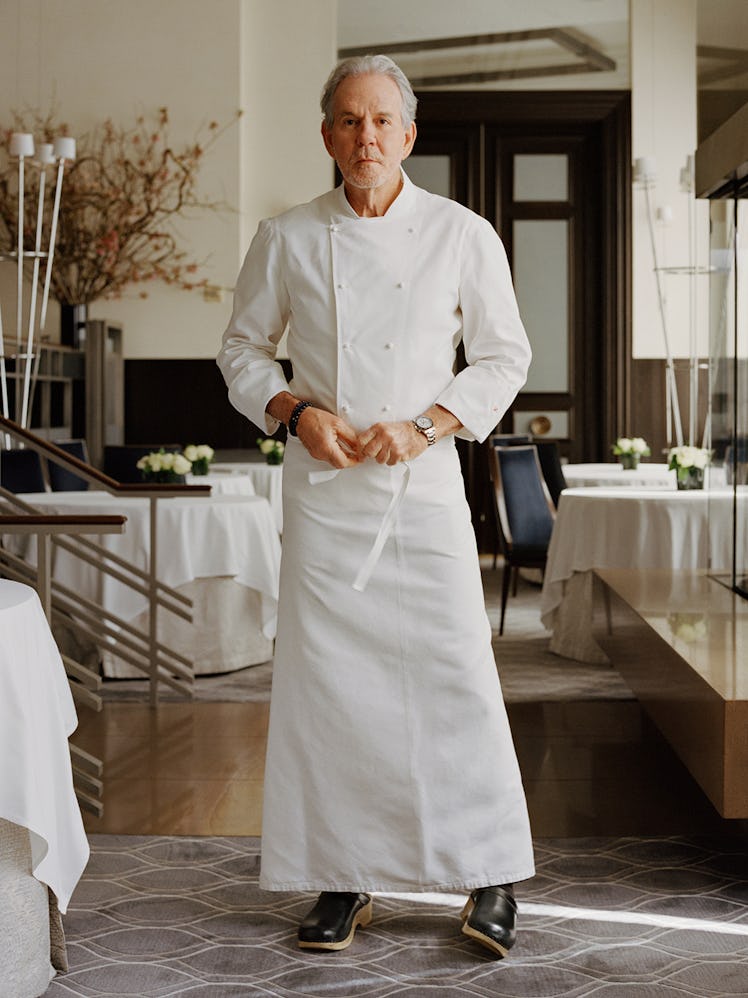The latest season of Chef’s Table: Legends traces your career from the Palm Beach Yacht Club restaurant your mother managed, where you washed dishes and cooked, to the French Laundry and Per Se, where you became the most Michelin-starred chef in America. On the show, you share a question that changed your life. You were just starting at the Dunes Club, in Rhode Island, when the chef, Roland Henin, asked you why cooks cook. You didn’t know, so he had to answer for you: It’s to nurture people. Why did that resonate?
Food is emotions, right? I wasn’t cooking for guests at the Dunes Club. I was cooking the staff meal—meatloaf and chili and stuff like that. The emotional connection of nurturing really became apparent to me, and the ability to nurture people through food was obvious. Roland became my guiding light, my mentor, and I wanted to be just like him.
In the episode, you also mention that he had a beautiful German girlfriend and a cool Jeep. Did that have anything to do with your decision to become a chef?
Of course! I mean, sure.
You moved to France in 1983 to immerse yourself in the country’s fine dining culture. What did you want to change about American fine dining when you came back two years later?
My goal was to excel at what I did, using the example of the great chefs and great restaurateurs in Paris and all over Europe. Did I always want to open my own restaurant? Sure. I’m an entrepreneur at heart. I delivered newspapers. I shined shoes. I sold firecrackers to my friends for twice as much as they cost me. I was always trying to be successful. The question was how we were going to make what had been considered fine dining more casual. The intimidation factor had to go away. At the end of the day, if you’re not having fun in my restaurants, we’re not doing a good job.
You purchased the French Laundry in 1994. Within four months, you received the first of many four-star reviews for the playful dishes on the tasting menu, like an ice cream cone–inspired salmon cornet. What drove you to become America’s most celebrated chef?
Well, that’s my mother: “If you’re going to do something, do it right.” My mother had very high expectations, very high standards. You had to achieve those, or else you’d get in trouble. [Laughs] Fear of getting in trouble from my mother was very strong. The higher the level of detail, the better you are. And never—I don’t want to say never—being satisfied.…
Laura Cunningham, your partner in life and work, said that in the episode!
She’s 90 percent right. There’s 10 percent of me that’s satisfied. How can I not be happy with what I’ve achieved? I mean, come on! I’m the fifth kid, from a middle-class background, with a broken family. Barely finished high school, no culinary education, and I end up being one of the most recognized chefs in America. How does that happen? I wake up every day and think about that. But at the same time, when I start to drill down on the details, I realize I could do better. There can be 100 guests who come in and 99 have an amazing experience, and one of them says, “The food is salty,” and we’re like, “Shit. We failed.”
Do you want to maintain those standards in perpetuity?
I realized 40 years ago that I run a sports franchise. An athlete or a chef can’t do the same thing he did from the beginning of his career until the end of his career. Physically, it’s impossible. But you can find ways to continue to be part of the team. I always say that the most important things we can do are hire the right person, train the right person, and mentor the right person. If you do those three things correctly, what happens? That person is better than you are. If they’re not better than you are, then you’ve done a shitty job.
What would you tell a young cook eager to achieve your level of fame?
Fame is not what we teach, or what we aspire to. Fame is something that somebody gives you, and fame is something that somebody takes away from you. So you have no control over it. Fame is really irrelevant. It’s important to exemplify to the young generations that the way you’re going to get recognition is by doing the job every single day.
Imagine you had to go on Ozempic for health reasons. What would you do with all that free time and brain space?
I’d learn how to break 80 in golf.
Sittings editor: Tyler VanVranken; Grooming by Melissa DeZarate for La Mer at A-Frame Agency; Photo Assistant: Storm Harper.
